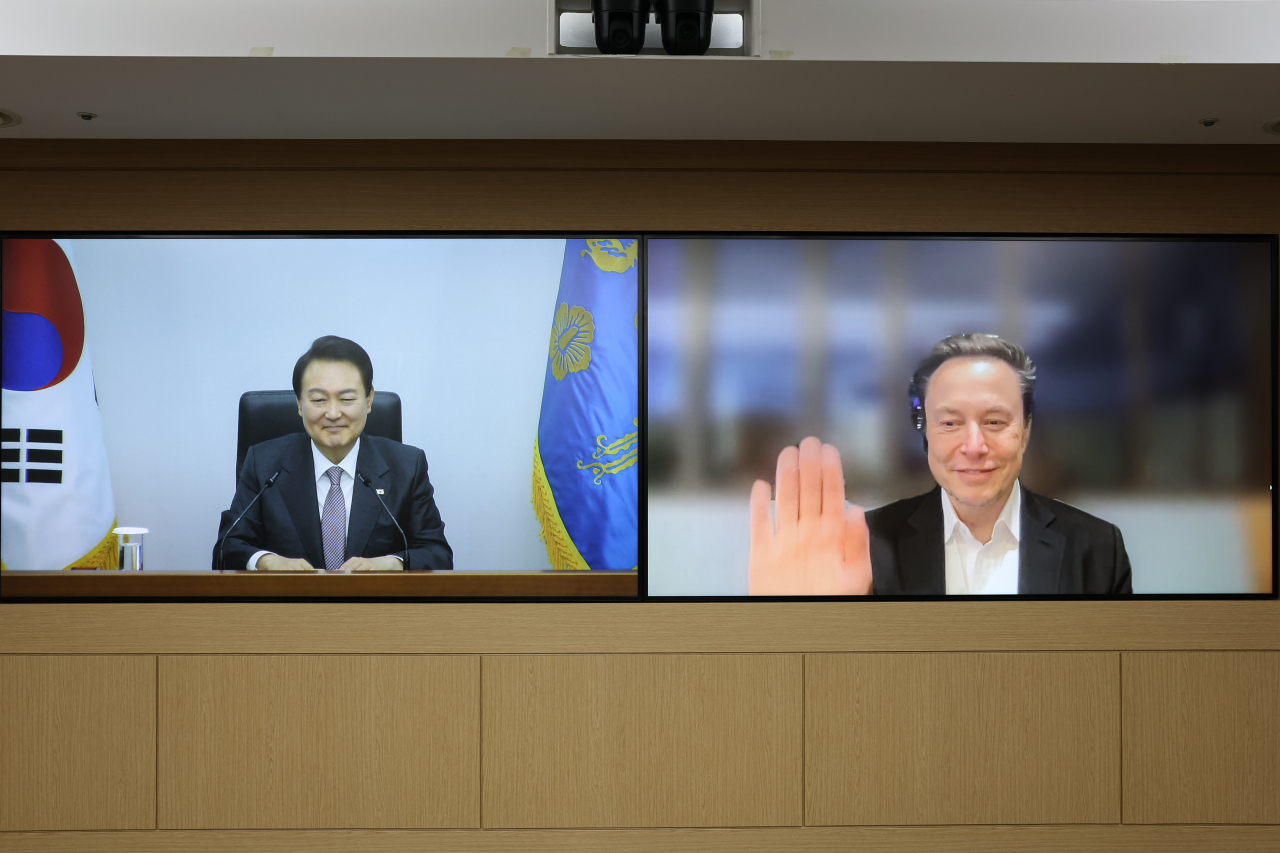Yoon asks Tesla chief to build 'gigafactory' in South Korea
Tesla CEO says Korea among his top investment candidates
By Shin Ji-hyePublished : Nov. 23, 2022 - 12:05

President Yoon Suk-yeol has asked Elon Musk, CEO of Tesla & SpaceX, to make significant investments in South Korea, including building a production facility for electric vehicles here, during a meeting held via videoconference Wednesday morning, the presidential office said.
Initially, Yoon was scheduled to meet with Musk face-to-face at the B-20 summit in Bali, Indonesia. However, the meeting was canceled as Musk was unable to make the trip to Bali. Instead, they decided to meet virtually at 10 a.m. (local time).
Yoon exchanged views with Musk “on global technological innovation” and discussed specific ways to “cooperate in investment in Korea regarding electric vehicle production,” according to a written statement released by the presidential office.
After listening to Tesla's plan to build what it calls a "gigafactory" to produce finished electric vehicles in Asia in the future, Yoon spoke to Musk about Korea's “world-class automotive industry ecosystem and investment conditions” and “asked for an investment in Korea.”
Gigafactory is Tesla's factory to produce electric batteries on a huge scale. There are currently five gigafactories around the world: the US, Germany and China. Tesla is seeking a place to build a new gigafactory in Asia in the first quarter of next year, and Yoon’s request is “a direct demand” for the firm to build in South Korea, according to a presidential official on the condition of anonymity.
In response, Musk said he considers Korea one of the top investment candidates and plans to make a decision by comprehensively reviewing investment conditions such as manpower, technology levels and the production environment of Asian candidates, the statement said.
Musk also expressed his willingness to actively invest in Korea's electric vehicle charging infrastructure, saying Tesla is still using Korea's superior parts in autonomous driving and artificial intelligence-related fields.
The CEO said supply chain cooperation with Korean companies is expected to expand significantly, with parts purchases from Korean companies expected to be more than $10 billion next year. This is almost double that of this year’s $5.7 billion, according to the office. After Musk’s remarks, share prices of some Korean automotive and battery firms shot up.
Daelim University automotive professor Kim Pil-soo said Musk could weigh the pros and cons of building a gigafactory in Korea. While Korea has advanced automotive and battery technologies that would create synergy with the US EV maker, the nation has no essential resources like Indonesia's nickel reserve -- another possible candidate -- and no Tesla factories to use the batteries.
Choi Sang-mok, the senior presidential secretary for economic affairs, said in a press briefing in the afternoon that the government would form a task force team comprising representatives from the Industry Ministry and the Korea Trade-Investment Promotion Agency to carry out activities to attract investment by closely cooperating with Tesla.
President Yoon “highly praised” Tesla, which has been the pioneer of the electric vehicle era, and SpaceX, which has launched a recycled orbital-class booster. He praised Musk for his hard work leading the way and said he hopes to continue to innovate successfully.
Alluding to Nuri, the Korean space rocket that launched in June, the president said Korea is striving to strengthen its competitiveness in the space industry by fostering space and aviation startups and promoting the establishment of an aerospace agency.
Yoon also asked for cooperation between SpaceX and Korean companies in the space industry, officials said.
The president vowed for a “reform” in line with global standards if "unreasonable regulations" hinder global high-tech innovation companies from pursuing investment in Korea.
The presidential office said the government would continue its efforts to attract investment from high-tech companies to strengthen national competitiveness.







![[KH Explains] How should Korea adjust its trade defenses against Chinese EVs?](http://res.heraldm.com/phpwas/restmb_idxmake.php?idx=644&simg=/content/image/2024/04/15/20240415050562_0.jpg&u=20240415144419)











![[Today’s K-pop] Stray Kids to return soon: report](http://res.heraldm.com/phpwas/restmb_idxmake.php?idx=642&simg=/content/image/2024/04/16/20240416050713_0.jpg&u=)